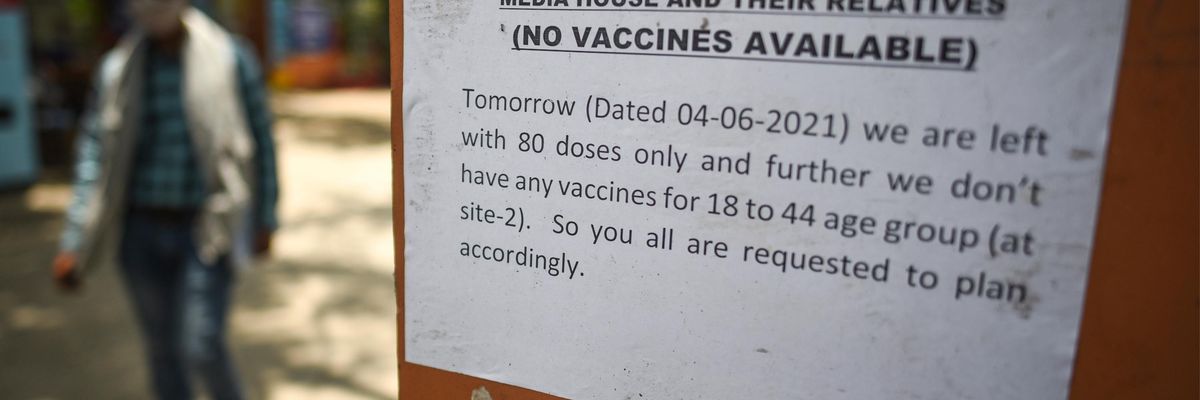More than a year after South African and Indian officials first proposed waiving intellectual property barriers for Covid-19 treatments and vaccines, human rights lawyers and advocacy groups on Thursday threatened legal action against the governments of several wealthy countries that are opposing the waiver.
"The consequences of a failure to adopt the TRIPS waiver could be millions of lives."
The European Center for Constitutional and Human Rights (ECCHR) in Germany, law professor Mads Adenas of the University of Oslo in Norway, a coalition of dozens of human rights groups in Canada, and U.K.-based advocacy groups Global Justice Now and Just Fair warned officials in the four countries that they are violating international human rights law by failing to support a waiver of the Trade-Related Aspects of Intellectual Property Rights (TRIPS) Agreement at the World Trade Organization (WTO).
Public health experts have warned that the failure to waive intellectual property rights for vaccines and treatments has fueled global vaccine inequality; fewer than 1% of vaccine doses have been administered in the Global South, while 74% of doses have gone to people in high-income countries. Only 5.5% of people in low-income countries have received at least one dose.
As the groups issued their warnings on Thursday, scientists in South Africa announced a new variant with an "unusually large number of mutations" has caused "serious concern."
In a letter to the U.K. secretary of state for international trade, Just Fair and Global Justice Now said the government's refusal to support a TRIPS waiver "is contrary to the U.K.'s obligation to perform its obligations under international human rights treaties in good faith."
"The vast majority of the international community has settled upon the TRIPS waiver as a necessary aspect of international cooperation to protect the rights to life and health of millions of people across the world," reads the letter, in which the groups said the U.K. is violating Article 28 of the Universal Declaration of Human Rights, Articles 55 and 56 of the United Nations Charter, and Article 2 of the International Covenant on Economic, Social and Cultural Rights (ICESCR), among other treaties, including trade agreements.
From the letter:
Supporting the proposed waiver of TRIPS obligations is consistent with WTO Members' own previous agreements regarding the interpretation and application of TRIPS. In fact, the WTO Agreement explicitly contemplates this possibility of a waiver (WTO Agreement article IX:3(b)). Moreover, there is precedent for a waiver in response to the widespread and uncontrolled outbreak of a disease, in the form of the WTO General Council's decision to implement paragraph 6 of the Doha Declaration. The Doha Declaration in respect of public health was adopted by the Ministerial Conference, as a result of the HIV/AIDS epidemic in Southern Africa in 2001.
The letter came as more than 130 civil society groups called on the WTO to postpone its ministerial conference, planned for next week, and instead work to urgently approve a TRIPS waiver.
In Canada, signatories including the Canadian Civil Liberties Association, Oxfam Canada, and Partners in Health Canada warned the country's minister of international trade that a failure to support a TRIPS waiver could amount to a violation of the Canadian Charter of Rights and Freedoms as well as international law.
"It would violate the rights of vulnerable residents of Canada to life and security of the person under section 7 of the Canadian Charter and the rights of women, the elderly, persons with disabilities, Indigenous peoples, Black people, other racialized persons, persons experiencing poverty and other groups... that are [disproportionately] affected" by the coronavirus pandemic, the groups wrote.
"Germany can no longer defend a position that enforces vaccine apartheid and which unnecessarily prolongs the pandemic situation worldwide."
The Canadian government could face legal challenges in domestic courts "in co-ordination with similar litigation initiatives in several other countries that have failed to support the proposed waiver," the groups wrote.
The ECCHR filed its letter of claim against the German government on behalf of Ugandan citizens. More than 70% of Germany's population has received at least one dose of a Covid-19 vaccine, compared to 8.7% in Uganda.
"It is important that the German government lives up to its extraterritorial human rights obligations and does everything within its power to enable equitable access to the most effective Covid-19 vaccines," said Miriam Saage-Maass, vice legal director at ECCHR. "Germany can no longer defend a position that enforces vaccine apartheid and which unnecessarily prolongs the pandemic situation worldwide."
Under pressure from civil society groups, more than 100 countries including the United States have expressed support for waiving the TRIPS agreement to allow countries in the Global South to develop generic versions of the most effective Covid-19 vaccines. The Canadian advocacy groups noted that Prime Minister Justin Trudeau has "repeatedly stated" that the vaccines must be made widely available in all countries, even as his government has persisted in blocking a waiver.
"The consequences of a failure to adopt the TRIPS waiver could be millions of lives," wrote the Canadian groups, "both in those countries that have little or no access to necessary products and technologies" and in the Global North, where people remain vulnerable to new variants of Covid-19.




